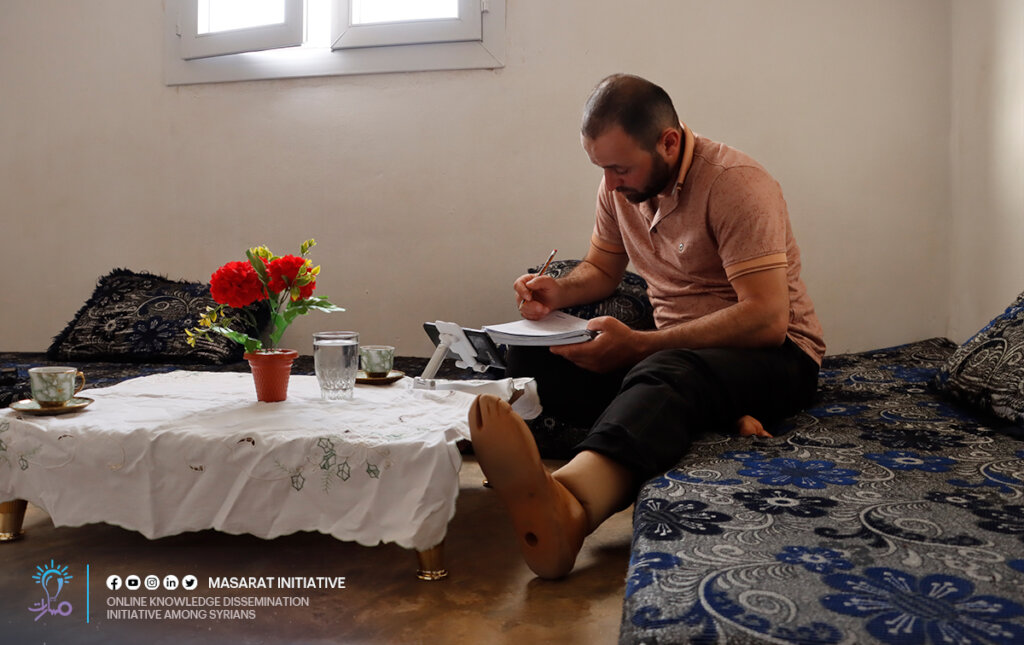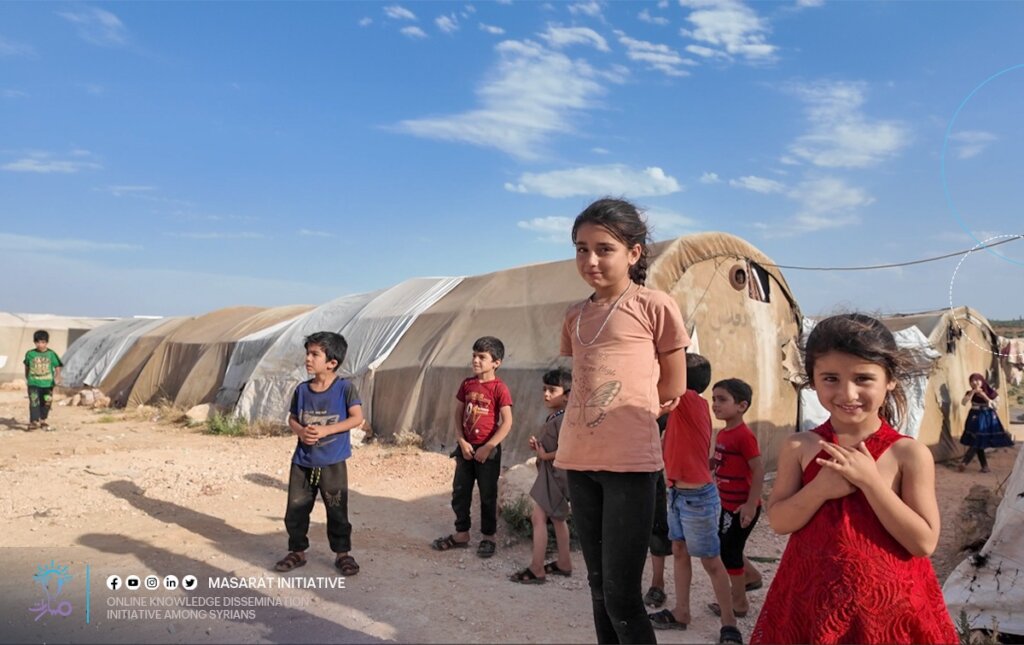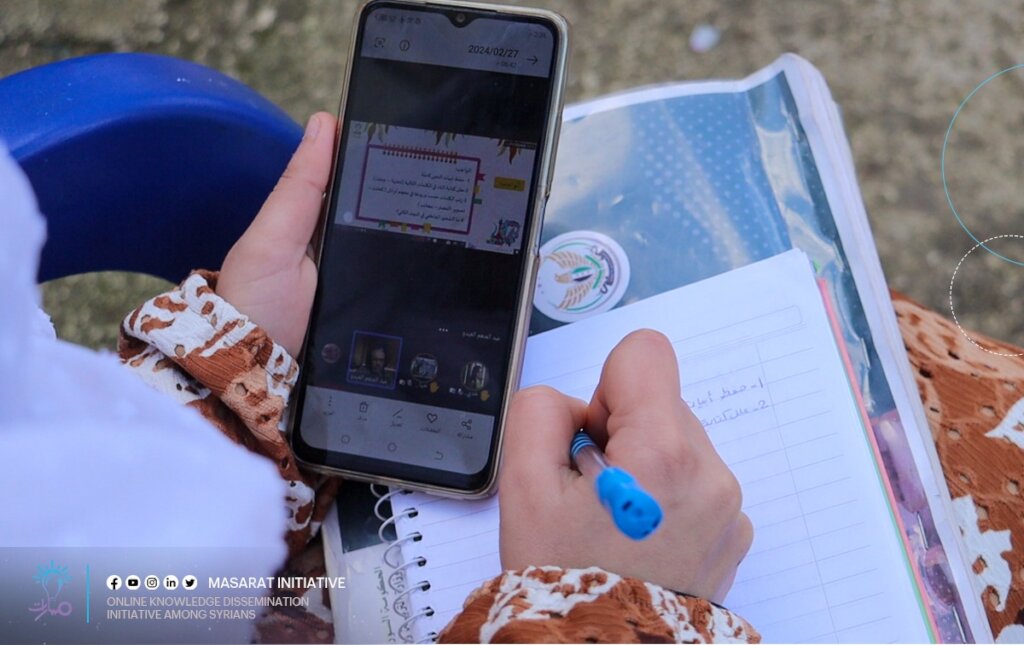Ashura… the great day when Allah distinguished between truth and falsehood, saving Moses and drowning Pharaoh and his army. Allah said about this great event:
“When the two hosts saw each other, the companions of Moses said, ‘We are sure to be overtaken.’ Moses said, ‘Nay, verily! With me is my Lord, He will guide me.'” (Ash-Shu’ara 61-62).
Ashura is a special day with a significant place in the hearts of Muslims. This year, it falls on Tuesday, the tenth of Muharram, and the sixteenth of July 2024.
In this article, we will discuss the virtue Sadagah on Ashura, the most beloved deeds to Allah on this day, and how you can contribute to charity through Masarat Initiative to support education in northern Syria.
Information About the Virtue of Ashura
What is Ashura?
When the Prophet Muhammad (peace be upon him) migrated to Medina, he found the Jews fasting on the tenth of Muharram.
When he asked them about it, they said: “It is a day when Allah saved Moses and his people and drowned Pharaoh and his people.
Moses fasted on this day as a sign of gratitude, so we fast as well.” The Prophet responded: “We have righter and are closer to Moses than you.”
So, the Prophet fasted on Ashura and commanded the people to fast. He even sent a message to the Ansar:
“Whoever woke up fasting today should complete his fast, and whoever is not fasting should refrain from eating for the rest of the day.” He strongly encouraged fasting on this day.
The Prophet (peace be upon him) fasted Ashura for nine years, and in the last year, he said: “If I live until the next year, I will fast on the ninth as well.” However, he passed away before he could do so. He advised us: “Fast a day before or a day after Ashura to differ from the Jews.”
When is Ashura?
Ashura falls on the tenth day of Muharram, the first month of the Islamic lunar calendar, which this year corresponds to Tuesday, July 16, 2024.
Imam Ahmad ibn Hanbal said: “If one is unsure about the beginning of the month, he should fast for three days to be certain of fasting on the ninth and tenth.” Based on this, fasting on Ashura has three levels:
- Fasting on the ninth, tenth, and eleventh.
- Fasting on the ninth and tenth.
- Fasting on the tenth alone.
The Prophet intended in his later years not to fast on Ashura alone but to fast on the ninth as well to differ from the People of the Book. He said: “Ashura is one of Allah’s days. Whoever wishes to fast, let him fast, and whoever wishes to leave it, let him leave it.”
Hadiths Mentioning the Virtues of Ashura
Numerous hadiths from the Prophet (peace be upon him) highlight the virtue of Ashura, including:
1- The Prophet said: “Fasting on the day of Ashura, I hope Allah will expiate the sins of the previous year.” (Muslim). This indicates the great virtue of fasting on Ashura, as it expiates the minor sins of the previous year.
2- The Prophet said: “There is no day superior in fasting except for Ramadan and Ashura.” (Tabarani). Although fasting on Ashura is not obligatory, it is highly recommended because the Prophet was keen on fasting it.
3- Abu Huraira reported: The Prophet said: “The best fast after Ramadan is in the month of Allah, Muharram.” (Tirmidhi). Ashura falls within this month and offers expiation for the past year’s sins.
4- Rabi’ bint Mu’awwadh said: The Prophet sent a message to the villages of the Ansar on the morning of Ashura: “Whoever is fasting should complete his fast, and whoever is not fasting should refrain from eating for the rest of the day.” She said: “We used to fast it thereafter and make our children fast.
We would make toys from wool for them, and when any of them cried for food, we would give them the toy until it was time to break the fast.” (Bukhari).
This indicates the importance of encouraging children to participate in the fasting of Ashura.
Beloved Deeds to Allah on Ashura
Due to the special nature of Ashura, we should strive to perform the most beloved deeds to Allah on this blessed day, including:
- Fasting for its great reward and the expiation of sins as mentioned by the Prophet.
- Praying, especially in congregation, and increasing voluntary prayers as they are among the best acts of worship.
- Guarding the senses against prohibited actions, following Allah’s command: “Indeed, the hearing, the sight, and the heart – about all those [one] will be questioned.” (Al-Isra 36).
- Increasing in remembrance of Allah and maintaining it throughout the day, especially saying “Subhanallah, Alhamdulillah, La ilaha illallah, Allahu Akbar.”
- Supplicating for forgiveness and deliverance from the Fire, as the Prophet frequently recited: “Our Lord, give us in this world good and in the Hereafter good and protect us from the punishment of the Fire.”
- Performing good deeds like Sadaqah, especially in impactful areas such as education, which forms the foundation of a strong nation. You can do this through the Masarat Initiative, which focuses on educational work.
- Maintaining family ties and honoring parents, which are among the best deeds on Ashura. The Prophet said: “Would you then, if you were given authority, cause corruption in the land and sever your ties of kinship?” (Bukhari).
The Virtue of Fasting on Tasu’a and Ashura
Fasting on Ashura is one of the most beloved deeds to Allah. It is recommended to also fast on Tasu’a, the day before Ashura.
The Prophet intended to do this, saying: “If I live till next year, I will fast on the ninth as well.” (Muslim).
This indicates the importance of fasting both days to gain more reward. The Prophet also said: “Fast on the Day of Ashura, but differ from the Jews by fasting a day before it or a day after it.”
The wisdom behind fasting on the ninth along with the tenth, as stated by Al-Nawawi, may Allah have mercy on him, is:
- To differ from the Jews who fast only on the tenth.
- To ensure accuracy in fasting the tenth, in case of an error in counting, so the ninth would actually be the tenth.
Some of the early Muslims used to fast on Ashura and Tasu’a while traveling to avoid missing it. Among them were Ibn Abbas, Abu Ishaq Al-Sabi’i, and Al-Zuhri, due to its virtue.
Al-Zuhri said: “Ramadan can be made up on other days, but Ashura is unique and cannot be made up.” Meaning, there is no compensation for fasting Ashura if it is missed, unlike the compensatory fasting allowed for missed days of Ramadan.
Sadaqah on Ashura
Charity is one of the righteous deeds and one of the most beloved acts to Allah.
Doing good deeds during special seasons and days like Ashura has a more beautiful reward because the reward is multiplied, and Allah’s bounty is abundant.
Charity on Ashura has great virtue, being an act of support and aid to those in need, fostering social solidarity and brotherhood.
Ruling on Sadaqah on Ashura
Charity is not obligatory for a specific amount; it is given according to one’s ability without specific conditions. It can be given at any time and in any amount, including:
- Charity through words.
- Charity through actions.
- Charity through wealth.
However, charity on Ashura is not obligatory but highly recommended due to the significance of this day and the Prophet’s emphasis on it.
Amount of Sadaqah on Ashura
There is no specified amount for charity on Ashura. One can give as much as they can for several reasons:
- Gaining reward and blessings due to the significance of this day.
- Addressing the great need experienced by many in conflict areas.
- The personal impact of charity on the giver.
- The positive effect of charity on the recipients.
Recipients of Sadaqah on Ashura
You can give charity on Ashura to the poor, needy, orphans, widows, students, people with special needs, and anyone in need.
You can also channel your charity through charitable institutions and organizations that support these groups.
Organizations like Masarat Initiative facilitate the process of delivering your donations, supporting students in northern Syria by providing high-quality, free education to help them build a better future despite the ongoing conflict.
The Virtue of Sadaqah on Ashura
The virtue of charity extends beyond the reward in the Hereafter. It brings immediate benefits in this world, including:
- Protection from various calamities.
- Purification and blessing of wealth.
- Peace of mind and heart.
- Healing of diseases, as the Prophet said: “Treat your sick with charity.”
Sadaqah also fosters social solidarity, as it:
- Supports community members like a solid structure.
- Instills a sense of brotherhood and love.
- Alleviates the suffering of the poor and needy.
- Enhances cooperation and solidarity among people.
And in that lies great reward and merit, especially when done with sincere intentions.
Allah says in the Holy Qur’an: “The example of those who spend their wealth in the way of Allah is like a seed [of grain] that sprouts seven ears; in every ear are a hundred grains. And Allah multiplies [His reward] for whom He wills. And Allah is all-Encompassing and Knowing.” (Al-Baqarah 2:261).
Through charity, the wealthy can assess the conditions of those with lower incomes and the needy, striving to meet their essential needs.
One of the most important needs is helping them secure their children’s basic right to education. This is the good that the Masarat Initiative aims to facilitate for you.
Donating Sadaqah on Ashura for Students in Syria
Syria has faced severe hardships for years, significantly impacting the educational infrastructure. About 2.4 million students have left school to support their families.
They need substantial support to return to education, including access to educational resources and financial assistance for their families.
Ashura is an opportunity to give charity to support education in northern Syria and help students continue their studies, building a better future for themselves and their community.
You can do this by contacting organizations like Masarat Initiative to learn how to contribute.
Masarat Initiative for Sustainable Development and Support of Syrian Youth
Education is a cornerstone of sustainable development, significantly impacting the future of communities and nations.
Masarat Initiative aims to support Syrian students who have been unable to continue their education due to the crisis.
The initiative provides educational support to students, enabling them to build a better future. Education opens doors to opportunities and enhances youth’s abilities and skills necessary for the future.
To continue its work effectively, Masarat needs collective efforts and cooperation from you. Ashura is a great occasion to get closer to Allah through such righteous deeds.
Through Masarat Initiative, you can support students by:
- School Education Program: Ensuring students who found themselves outside the educational system receive interactive online lessons.
- Student Activities Program: Developing all aspects of the student’s personality through programs and practical opportunities.
- Academic Advising Program: Helping students achieve their academic and career goals and choose their field of study.
- Vocational Training Program: Providing skills and training suited to beneficiaries, ensuring their independence and decent living.
Conclusion:
Supporting Syrian youth through education and developmental projects has a significant positive impact on them and society, contributing to creating a generation of educated, cultured youth capable of leading change and reform.
It also promotes social and economic stability and helps build a brighter future for the country.
Ashura is a great occasion to contribute to this cause, planting the seeds of goodness, cooperation, and love in our communities. Do not hesitate to contact Masarat Initiative now.











